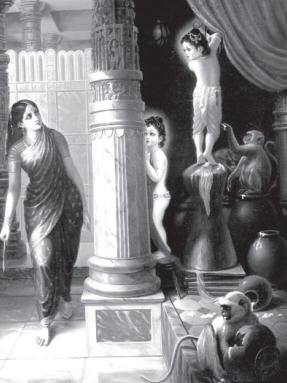Is Krsna's stealing butter thievery or deep exchange of pure love?
Long long ago, there was a beautiful dark skinned boy with eyes as wide as lotus petals and lustrous tresses of black curly hair. His name was Gopala Krsna and He lived in the ancient hamlet of northern India known as Vraja. His father's name was Nanda and His mother's name was Yasoda. Gopala belonged to the community of cowherd men and women. All of them had hundreds, thousands and millions of cows and calves.

Gopala was a very mischievous child. He and His cowherd boy friends (gapas) would steal butter (makhana) and yogurt(dahi). They would break butter pots (that were hanging from the roofs of the gapls) and even feed the butter to the monkeys. That is why Gopala is called makhana cor.
It seems rather strange that the son of the king of Vraja, Nanda Maharaja, should steal butter especially since Nanda possessed an incredible 9,00,000 surabhi cows that gave unlimited quantities of wholesome milk. Scarcity or deprivation of essential basic nutritional needs (in one's own h ome) were certainly not the reason for such pilferage. If Gopala Krsna had stolen jewellery, garments or other valuable articles, it could have been seen as some sort of kleptomania. But, infants are known to have a penchant for carrying off anything that comes within their vision and neighbours generally do not take offence, understanding it to be a symptom of playful innocence.
At times, Gopala would gaze at the full moon and cry for it, thinking it to be fresh, condensed butter. Was this some sort of butter mania? Strangely, millions of devotees revere Krsna as 'makhana cor' – one may ask since when has stealing become worshippable?
One of the many names of God is Hari i.e. he who forcibly takes away everything inauspicious. In Gita, Krsna describes Himself as death personified – mrtyuh sarva-haras caham – wherein everything is taken away, ultimately. When one possesses something that is unenduring (and therefore ultimately worthless) such as a material body that is susceptible to progressive stages of deterioration – specifically disease and old age – that helpless person honestly prays for the relief of death. So when God forcibly takes that suffering soul out of an incapacitated body, it should be regarded as an auspicious act of kindness and not cruelty.
But that still does not solve the riddle of an infant stealing only butter. Gokula means an abode of cows where there is bound to be an enormous surplus of milk and its allied products. This white frothy miracle drink is looked upon as religion (dharma) in a fluid state. When milk is churned adequately, it transforms into soft, golden, creamy butter. Taking the same analogy further – the principles of dharma, if adhered to honestly and faithfully, lead to loving devotion to God. A pot brimming over with soft, creamy butter signifies a heart overflowing with love – this attracts the Lord to come and relish the state of that pure devotion. But, He has to steal this love from a humble, soft-hearted devotee who considers himself to be utterly devoid of any trace of goodness.
Krsna's act of stealing butter from the neighbours, brought the gopis complaining to Yasoda: that her son was caught red-handed. Confronted by the stern looks of His mother and trembling with the fear of being reprimanded, Gopala begged to all of them, appealing helplessly with tears of innocence in His eyes. Everyone's hearts were stolen away (having melted with inten sified affection) at this extraordinary expression of sweetness on the child's face. They begged Yasoda: not to punish her child, confessing that it was their inner desire that Krsna steal their butter.
When a thief steals, others pursue him to recover their stolen property. But, when Krsna steals a devotee's heart, that fortunate devotee runs after Him helplessly; and in doing so, the devotee steals away Krsna's heart. Ultimately, it is not a case of kleptomania or butter craziness, but an intimate revelation of an exchange of the taste of pure, ambrosial love that the Lord and His devotees have for each other, which is being eulogized in this popular pastime of makhana cor Krsna.
Damodara Pandita Dasa serves as a spiritual counsellor at Bhaktivedanta Hospital, Mumbai.
